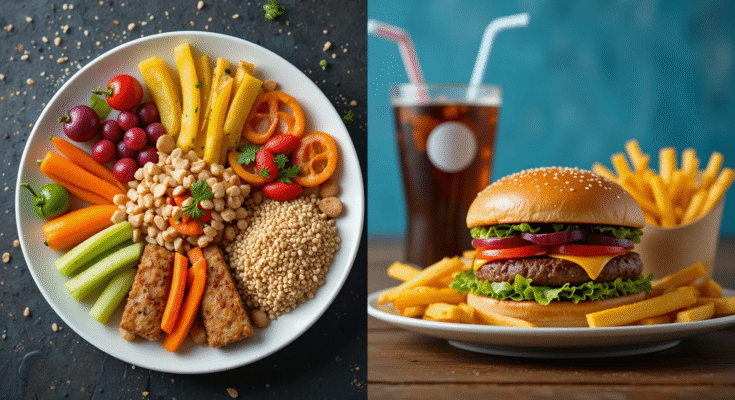
In today’s fast-paced world, people are more health-conscious than ever. Everywhere we look — social media, magazines, YouTube — there are advertisements for “quick weight loss” solutions and trendy diets. From keto to intermittent fasting, detox juices to extreme calorie restrictions, fad diets promise instant results. But do they really work in the long run?
On the other hand, health experts emphasize the importance of a balanced diet — a way of eating that includes all essential nutrients in the right proportions. Instead of quick fixes, it focuses on long-term health and sustainability.
This article explores the difference between a balanced diet and fad diets, their effects on the body, and why choosing the right path is crucial for lasting health.
1. What is a Balanced Diet?
A balanced diet provides the body with all essential nutrients — carbohydrates, proteins, fats, vitamins, and minerals — in appropriate amounts. It supports growth, energy, immunity, and overall well-being.
A typical balanced diet includes:
- Fruits and vegetables – rich in vitamins, fiber, and antioxidants
- Whole grains – provide energy and support digestion
- Lean proteins – build muscles and repair tissues
- Healthy fats – support brain function and hormone balance
- Hydration – water, herbal teas, and natural fluids
Unlike fad diets, a balanced diet is not restrictive. It allows flexibility, variety, and moderation.
2. What Are Fad Diets?
Fad diets are eating patterns that become popular for a short time, often promoted by celebrities or influencers. They promise rapid weight loss or “miracle” health benefits.
Examples include:
- Keto Diet – very low carbs, high fat
- Atkins Diet – high protein, low carb
- Juice Cleanses – liquid-only diet
- Detox Diets – restrict certain foods for “cleansing”
- Cabbage Soup Diet – extreme low-calorie meal plan
While some may show quick results, most fad diets are unsustainable, nutrient-deficient, and can harm long-term health.
3. Benefits of a Balanced Diet
Eating a balanced diet has numerous advantages, such as:
- Steady and healthy weight management
- Stronger immune system
- Improved energy levels throughout the day
- Better skin, hair, and overall appearance
- Reduced risk of chronic diseases like diabetes, heart disease, and obesity
- Improved mental clarity and focus
4. Risks of Fad Diets
Though they may promise quick weight loss, fad diets often come with hidden dangers:
- Nutrient deficiencies (lack of vitamins, minerals, fiber)
- Weakness, fatigue, and low energy
- Loss of muscle instead of fat
- Digestive problems like constipation or diarrhea
- Slower metabolism over time
- Increased risk of eating disorders
- Weight regain once the diet stops (“yo-yo effect”)
These diets rarely teach healthy eating habits. Instead, they trap people in a cycle of restriction and bingeing.
5. Why People Fall for Fad Diets
Despite the risks, millions of people try fad diets every year. Why?
- Instant gratification – People want fast results.
- Social influence – Seeing celebrities or friends promote diets.
- Lack of knowledge – Confusion about what’s truly healthy.
- Marketing tactics – Companies profit by selling “quick fixes.”
Unfortunately, most people end up disappointed when the results don’t last.
6. Balanced Diet vs. Fad Diets: A Comparison
| Feature | Balanced Diet ✅ | Fad Diet ❌ |
|---|---|---|
| Sustainability | Long-term | Short-term |
| Nutrient intake | Complete | Deficient |
| Energy levels | Stable | Fluctuates |
| Weight loss | Gradual & steady | Quick but temporary |
| Health risks | Low | High |
| Mental health | Positive | Stressful & restrictive |
Clearly, the balanced diet wins as the healthier, long-term choice.
7. How to Adopt a Balanced Diet
Making small, realistic changes is the key to maintaining a balanced diet:
- Eat colorful meals – more fruits and vegetables
- Choose whole over processed – brown rice, oats, quinoa
- Control portions – avoid overeating even healthy foods
- Stay hydrated – drink at least 8 glasses of water daily
- Plan meals – prepare ahead to avoid junk food
- Practice moderation – enjoy treats occasionally without guilt
8. Psychological Benefits of a Balanced Diet
Food is not just about calories; it’s also about mindset. Eating balanced meals:
- Reduces cravings
- Prevents guilt and binge cycles
- Improves mood through stable blood sugar
- Encourages mindful eating and gratitude
Unlike fad diets, which often increase stress and obsession, a balanced diet promotes peace with food.
9. Role of Exercise with Diet
A balanced diet works best when combined with regular exercise. While fad diets may discourage workouts due to low energy, a balanced diet fuels the body for physical activity.
Exercise helps:
- Burn calories
- Build lean muscle
- Improve mood
- Support metabolism
The combination of exercise + balanced nutrition is the real secret to lasting fitness.
10. Long-Term Health is the Goal
Health is not just about short-term weight loss — it’s about living longer, stronger, and happier. Balanced diets support long-term well-being, while fad diets often harm health and create dependency.
Choosing balance over restriction ensures you can enjoy food, stay fit, and avoid health risks.
Final Thoughts
The choice between a balanced diet and a fad diet is ultimately about mindset. Do you want a quick fix that fades in weeks, or a healthy lifestyle that lasts a lifetime?
Fad diets may come and go, but the principles of balanced eating remain timeless. Focus on whole foods, variety, moderation, and consistency.
Remember: Health is not a sprint, it’s a marathon. A balanced diet is your best companion on this journey.
